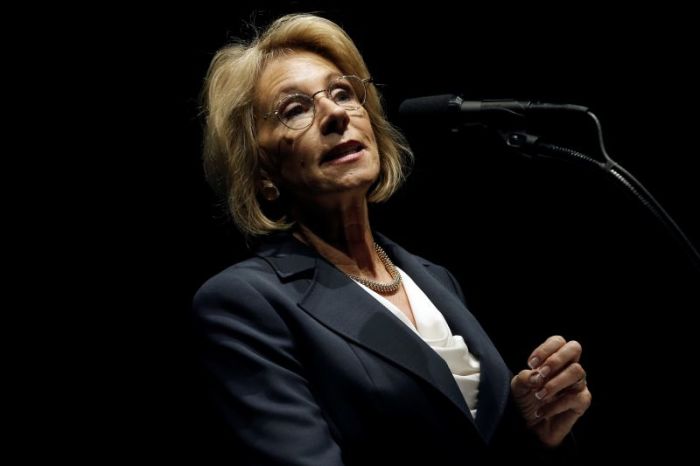Trump Admin. to Strengthen Religious Freedom Protections for Christian Colleges

The Trump administration is reportedly looking to strengthen religious freedom protections for Christian and other faith-based colleges and universities that receive federal tax dollars.
Citing a copy of the United States Education Department's spring regulatory agenda, Politico reported Wednesday that Education Secretary Betsy DeVos plans to review and rewrite rules that regulate the ways faith-based education institutions can access and use federal funding.
According to the news outlet, the Education Department will host a "rulemaking panel" to suggest changes to requirements that faith-based institutions face when they are involved in federal student aid initiatives and other federal higher education programs.
Agency officials reportedly noted in the document that there is some concern regarding rules that "unnecessarily restrict participation by religious entities" in such programs.
"For example, some provisions may be overly broad in their prohibition of activities or services that relate to sectarian instruction or religious worship," the document reads. "Other provisions may be overly broad in prohibiting the benefits a borrower may receive based on faith-based activity."
The department's agenda also indicates that it plans to edit rules that regulate the "the eligibility of faith-based entities to obtain grants from the department or to participate in state-administered programs and the activities that they may perform."
The department will "review to amend or rescind" certain regulations so that the department can be "consistent with current law" and "reduce or eliminate unnecessary burdens and restrictions on religious entities and activities."
The review of the department's rules relating to faith-based institutions comes after the U.S. Supreme Court's ruling last June in the Trinity Lutheran case. In that case, the court ruled that a Missouri law that prohibited a church from receiving funds as part of a secular aid program simply because it was a church was unconstitutional.
The Supreme Court ruled 7-2 in favor of Trinity Lutheran, which sought aid available to similar secular institutions to help renovate its daycare playground.
"Various provisions of the department's regulations regarding eligibility of faith-based entities and activities do not reflect the latest case law regarding religion, or unnecessarily restrict religion," Education Department spokeswoman Liz Hill said in a statement to Politico. "The department plans to review and to amend such regulations in order to be more inclusive."
The Education Department's review comes as there has been much concern that Christian colleges and other institutions that uphold faith-based stances on homosexuality could lose their freedom to uphold policies consistent with their beliefs.
When the U.S. Supreme Court ruled in 2015 to legalize same-sex marriage, Chief Justice John Roberts issued concern that the ruling would lead to religious freedom conflicts and the possibility that religious colleges could lose their tax-exempt status for upholding traditional policies on sexuality.
In fact, then-U.S. Solicitor General Donald Verrilli was pressed by Supreme Court Justice Samuel Alito during the oral arguments of the Obergefell case whether religious schools that don't provide housing to same-sex couples could lose their tax-exempt status.
"I don't deny that. I don't deny that, Justice Alito. It is, it is going to be an issue," Verrilli said.
Under pressure from LGBT activists, the Obama administration's Education Department released a "shame list" of hundreds of faith-based colleges that are seeking religious exemptions to Title IX law.
The Obama administration interpreted Title IX law in a way that required colleges that don't have the religious exemption to provide equal access to gay and transgender students.
In 2015, over 70 Christian education leaders pressed Congressional leaders calling for legislation that would protect Christian institutions from receiving government backlash for upholding biblical-based policies relating to marriage and sexuality.
Earlier this year, Sen. Mike Lee, R-Utah, reintroduced the First Amendment Defense Act, which seeks to protect individuals and institutions from government punishment over beliefs and policies that reflect opposition to same-sex marriage. The legislation was originally introduced in 2015 but was not taken up by committee.
The Education Department's review follows the line of previous actions taken by the Trump administration to preserve religious freedom.
Last March, Trump revoked an Obama-era executive order that banned federal contractors, several of which are faith-based colleges, from having policies that discriminate against people on the basis of sexual orientation or gender identity. When the order was signed in 2014, conservatives voiced concern that the order did not include a religious exemption.
Last May, Trump issued an executive order promoting free speech and religious freedom. That order called on the Department of Justice to issue a formal guidance "interpreting religious liberty protections in federal law" that will guide federal agencies in complying with the law.
Last October, Attorney General Jeff Sessions issued a sweeping religious freedom guidance.
In the guidance, Sessions stated that U.S. law includes specific prohibitions on religious discrimination that include "participation in or receipt of benefits from various federally funded programs."





























